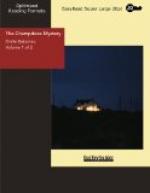“Yes. I do not like to use the word ‘conditions,’ but I think that you will understand what I mean. My daily toil for bread gave me neither the means nor the leisure which I required to cultivate my art, for that is a profession that I could never give up.”
“You will be certainly your own master.”
Andre paused, as if to reflect.
“This is not all I had to say,” he continued at last. “I love and am loved by a pure and beautiful girl; our marriage is arranged, and I think—”
“I think,” broke in the Duke, “that you could not love any one who was not a fit bride for a member of our family.”
“But I did not belong to this family yesterday. Be at ease, however, for she is worthy of a Champdoce. I am engaged to Sabine de Mussidan.”
A deadly paleness overspread the Duke’s face as he heard this name.
“Never,” said he. “Never; I would rather see you dead at my feet.”
“And I would gladly suffer ten thousand deaths than give her up.”
“Suppose I refuse my consent? Suppose that I forbid——”
“You have no claim to exercise paternal authority over me; this can only be purchased by years of tender care. Duke de Champdoce, I owe you nothing. Leave me to myself, as you have hitherto done, and all will be simplified.”
The Duke reflected. Must he give up his son, who had been restored to him by such a series of almost miraculous chances, or must he see him married to Diana’s daughter? Either alternative appeared to him to be equally disagreeable.
“I will not yield on the point,” said he. “Besides, the Countess would never give her consent. She hates me as much as I hate her.”
M. Lecoq, who had up to this moment looked on in silence, now thought it time to interpose.
“I think,” remarked he blandly, “that I shall have no difficulty in obtaining the consent of Madame de Mussidan.”
The Duke, at these words, threw open his arms.
“Come, my son!” said he. “All shall be as you desire.”
That night, Marie, Duchess de Champdoce, experienced happiness for the first time in the affection and caresses of a son who had been so long lost to her, and seemed to throw off the heavy burden that had so heavily pressed her down beneath its own weight.
When Madame de Mussidan heard that Andre was Norbert’s son, she declared that nothing could induce her to give her consent to his marriage with her daughter; but among Mascarin’s papers Lecoq had discovered the packet containing the compromising correspondence between the Duke de Champdoce and herself. The detective handed this over to her, and, in her gratitude, she promised to give up all further opposition to the match.
Lecoq always denied that this act came under the head of blackmailing.




